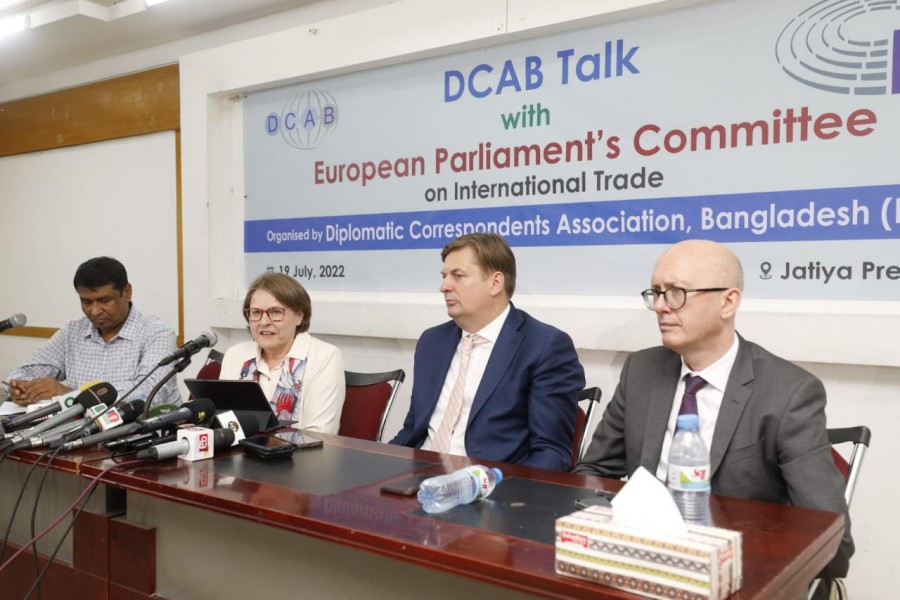The visiting European Union parliamentary delegation on Tuesday made it clear that Bangladesh must implement the Labour Roadmap and amend the EPZ labour rules to get the GSP plus facilities from EU.
They also tagged improving human rights and elimination of child labour to enhance trade ties between the EU and Bangladesh.
“ I wish to stress that full and successful implementation of the Roadmap is a clear precondition for our further trade relations”’ Ms Heidi Hautala, chair of the delegation and Maximillian Krah said while spoke on behalf of the delegation while addressing the DCAB Talks organised by the Diplomatic Correspondents’ Association of Bangladesh (DCAB) in the city.
“One year ago the government committed to implementing a Labour Roadmap. We strongly welcome this major step and we follow this with great attention because the successful implementation of the roadmap will be linked not only to EBA but also to your graduation process and the subsequent potential accession to GSP plus” she added.
The delegation expressed concern over ‘reported delays’ in putting the Labour Law and the EPZ Labour Law in full compliance with international standards.
“Compliance with standards should be ensured for all special economic and processing zones. We are aware of the important challenge this represents for your country and the EU has been fully supportive of this process” Ms Heidi said.
“But as these are two fundamental requirements in order to successfully transition to GSP+ it would be urgent to anticipate deadlines for entry into force and to ensure full effective implementation” she added.
Referring to their meetings with concerned govt officials she said “We have today received promising signals that EPZ Labour Law would be soon amended to correspond to the government’s commitments. No delay should be acceptable”.
On the child labour issue she said, the EU has a zero-tolerance policy on child labour, and the grouping attaches great importance to Bangladesh’s commitment to fully eliminate child labour by 2025.
“As you know, the EU GSP Regulation is currently under review, but clearly the European Parliament attaches great importance to ensuring effective implementation of GSP conditionalities, as well as to transparency” she pointed out.
Saying that adequate protection of labour rights can only be guaranteed if fundamental human rights are respected, she said respect for human rights is also a fundamental condition of GSP plus.
”Civil society must have adequate space for free expression and we pay great attention to concerning situations of extrajudicial killings and enforced disappearances. This situation is not compatible with core human rights conditions under the GSP plus” she added.
Expressing concern over the Digital Security Act, she said the EU is concerned about parts of the application of the Digital Security Act and the consequences this has been having on freedom of expression, notably in the case of journalists.
“I was happy to hear from the law minister that he has set in motion an amendment process.”
She also noted that the full implementation of labour law legislation also requires a well-functioning and independent judiciary system.
“The recent creation of labour courts is a step in that direction,” she said adding that the development of a truly independent and effective judiciary system for labour law would also be an important stepping stone towards the broader independence of judges, contributing to the longterm prosperity of the Bangladeshi people.
Among other conditionalities GSP+ requires the full implementation of the UN anti-corruption convention, she reminded.
“The EU is aware of its responsibility as a global importer and is indeed in the process of working on corporate due diligence legislation, which will apply to EU firms, also based on evolutions in a changed consumer mentality”
Asked to comment on Bangladesh Prime Minister Sheikh Hasina’s recent call to the western countries to give up the policy of imposing sanctions she said “I think it's a misconception to blame the West for the situation we are in because indeed the root cause is that we had to defend peaceful international order in a situation we have a serious violation of state sovereignty and independence”
“And if you if you don't agree with this basic point, then I understand that you might be against sanctions but sanctions are at the end of the day, one of the most important means to try to stop this conflict and make the invader withdrawal”
Responding to a question on the scope of energy import from Russia by Bangladesh amid the global energy crisis, Maximillian Krah, another EU delegation member however said, “ From what I know is that we do not push you to join sanctions. This is your sovereign decision”
“I'm from Germany, we have a trade minus since we decided to step into the sanctions and domestically I'm a very loud critic of this politics.”
“But nonetheless, to the outside, we follow the politics and we will review it and I'm sorry if you say you don't like it, but we can, on the other hand, do not accept that borders are changed by the military directly to our to our so you see it's a new situation” he explained.
“But until we have reviewed it we will follow this, you have to find your own sovereign way. But I don't think that it's our task now to advise you to push you and to make requirements. So you have your own sovereign government and you have to react and what we have to take care in my opinion is that this dispute does not harm our partnership and economic affairs” he said.
EU Ambassador in Dhaka Charles Whitley also attended the programme, moderated by DCAB President Rezaul Karim Lotus.
[email protected]


